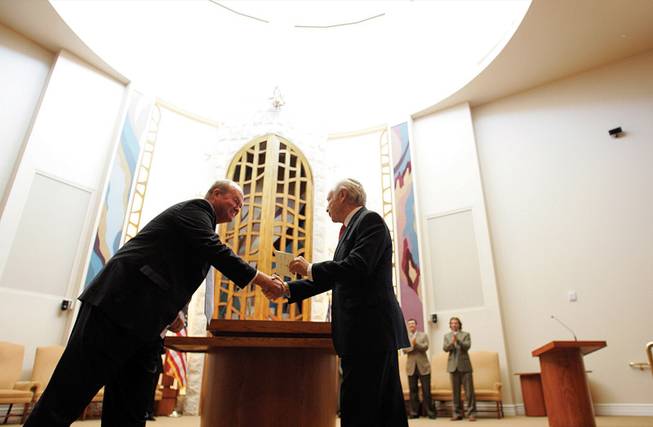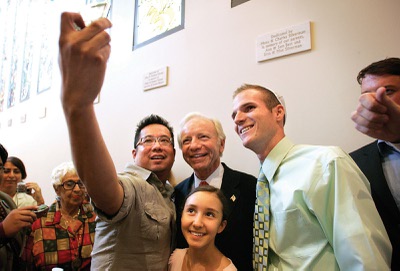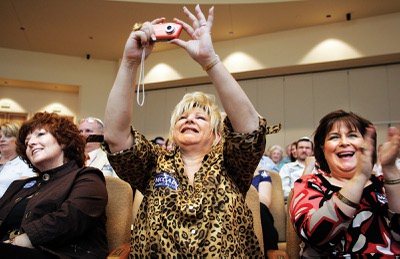
Republican state Sen. Bob Beers, left, greets Connecticut Sen. Joe Lieberman, a former Democrat, at Temple Beth Sholom in Las Vegas. Lieberman has endorsed McCain’s presidential bid and spoke to the congregation this week on his behalf.
Wednesday, Sept. 17, 2008 | 2 a.m.
Lieberman's speech at the Republican National Convention
Sun Expanded Coverage
Sun Archives
- Lieberman campaigns for McCain in Summerlin (9-15-2008)
- Tension trails Lieberman back to Washington (9-10-2008)
- Reid saw what Lieberman missed (8-10-2008)
Rabbi Felipe Goodman looked on Monday as Sen. Joe Lieberman, a onetime Democrat turned independent, spoke to his congregation on behalf of Republican presidential candidate John McCain.
Goodman, who has presided over Temple Beth Sholom for the past decade, has never seen his congregation more polarized. The warm reception Lieberman received is one indication that Jews, once firmly in the Democratic camp, are leaving the party, for a variety of reasons, as the presidential campaign enters the home stretch.
“People have lost friends over this,” Goodman said.
Indeed, a half-dozen Jewish leaders interviewed by the Sun this week said their congregations are more split over this election than over any in recent memory, with half of those leaders, both conservative and liberal, saying their congregants are evenly divided between the two parties.
“I think Jews are becoming more than ever before a two-party entity,” said Rabbi Kenneth Segel of Temple Sinai, who oversaw Arizona’s largest congregation for 30-plus years before moving to Las Vegas two years ago.
The split is surprising. Jews have traditionally been a strong Democratic constituency.
“When I was a kid growing up I didn’t know anybody who was Jewish who wasn’t a Democrat,” said Rep. Shelley Berkley, a leader on Jewish causes, both in Las Vegas and in Congress. “Now, with the passage of time, I can’t make that statement anymore.”
According to a 2002 Gallup analysis, party identification among Jews had remained static in the previous decade: 50 percent Democrat, 17 percent Republican and 32 percent independent. Those independents, however, voted for the past two Democratic presidential tickets in significant numbers. In 2000, Al Gore won 79 percent of the Jewish vote. Four years later, John Kerry captured 74 percent.
Recent national Gallup polls show Democratic presidential nominee Barack Obama leading McCain by 62 percent to 29 percent among Jewish voters.
(In the Nevada Democratic caucus, Jews favored New York Sen. Hillary Clinton by a margin of more than 2-to-1 over Obama.)
Jewish leaders in Las Vegas say the vote seems to be fracturing along generational lines.
“The Jewish community is looking deeper and more into the issues than our fathers did 50 years ago,” said Rabbi Hershel Brooks of Bet Knesset Bamidbar. “As any child of the modern times, they feel a little more free to choose and they do. They think about it and they don’t necessarily follow the way their father voted.”
Jewish leaders say they first began seeing a shift during the presidency of Ronald Reagan. His staunch support for Israel and economic policies were popular among many Jews, splintering some from what had been an overwhelmingly Democratic base since the days of Franklin Delano Roosevelt.
But now, said Rabbi Sanford Akselrad of Congregation Ner Tamid, “you’re several generations in.” Some Jews, he added, “relate less to the immigrant experience and working-class values.”
Nevada Jews have trended more conservative in recent elections. In 2004, Kerry’s share of the Jewish vote in Nevada was 12 points less than what he captured among Jews nationwide.
Gary Ratner, the Southwest director of the American Jewish Congress, said the movement to the right has been glacial, but there have been “blips” in Jewish support for Democrats, namely Jimmy Carter, who won 64 percent of the vote in 1976 and 45 percent in 1980.
Segel said Jews have split their tickets as the parties have become less monolithic, and wealthier Jews are being drawn to the Republican Party because of its embrace of limited government and low taxes.
“One tends to be more concerned with preserving and protecting what you have,” Segel said. “Taxation and other issues become much more important.”
In fact, neither candidate is attracting support so much as repelling it to the other, Segel said.
“We know more and yet we’re more cynical,” Segel said. “I’m not hearing great affection or adoration for either of these two candidates, by and large. I don’t see the passion for the man or the party ... It’s more of a negative elimination than it is a positive selection.”
Supporters of both tickets have sought to drive a wedge in the Jewish vote on the politically potent issue of Israel.
Seizing on comments Obama made early in the campaign, opponents have spread rumors about the Democrat’s alleged pro-Palestinian leanings. Obama told a small group of Democratic activists in Iowa, “Nobody is suffering more than the Palestinian people.” He later clarified his remarks in a presidential debate, saying his words were actually an indictment of the Palestinian leadership, which he deemed responsible for much of the Palestinians’ suffering.
In June, Obama delivered a speech to the American Israel Public Affairs Committee in which he voiced full-throated support for Israel. Berkley called the speech “extraordinary.” She added: “I’ve never spoken to a candidate who knew the issues so well and was so supportive.”
Still, for some Jewish leaders, the matter remains unsettled.
“I think McCain’s record on Israel is very clear,” Akselrad said. “Obama’s is less clear.”
In fact, as evangelicals’ stock with the Republican Party has risen, the party has sought to portray itself as the stronger advocate for Israel.
On Monday, Lieberman emphasized McCain’s support for Israel, relating comments the Republican made to an interviewer when asked about the possibility of a military strike on Iran’s nuclear facilities. “He said, ‘On my watch, as president of the United States, I will never allow the second Holocaust to occur in my lifetime.’ ”
The line brought the crowd to its feet.
Then there were the e-mails alleging that Obama is a Muslim (he’s Christian) that circulated among the Jewish community for months, as did video clips of his controversial former pastor, the Rev. Jeremiah Wright Jr.
The resulting uncertainty among Jews prompted the Jewish Council for Education and Research to launch JewsVote.org, a $500,000 online campaign aimed at countering rumors about Obama’s faith and his stance on Israel, among other issues, in the Jewish community.
The McCain campaign senses an opening among Jews, who represent about 4 percent of voters in Nevada and about 3 percent nationally, thus dispatching Lieberman to Temple Beth Sholom on Monday.
McCain’s vice presidential pick, Alaska Gov. Sarah Palin, may bring a problem though. Palin is a social conservative with strong evangelical Christian roots. Her record on Israel is thinner than Obama’s. And last month, her church, the Wasilla Bible Church, gave its pulpit over to David Brickner, the executive director of Jews for Jesus, a group viewed with deep hostility by most Jewish organizations, including the Anti-Defamation League.
Palin’s pastor, Larry Kroon, told Sun partner Politico that Palin was in the audience that day but cautioned against attributing Brickner’s views to her. In the Politico piece, a spokesman for the McCain-Palin campaign dismissed the notion that Palin would be problematic among Jews, adding, “Once she’s had a chance to make her positions clear on these issues, the Jewish community is going to be very, very comfortable with her.”



Join the Discussion:
Check this out for a full explanation of our conversion to the LiveFyre commenting system and instructions on how to sign up for an account.
Full comments policy